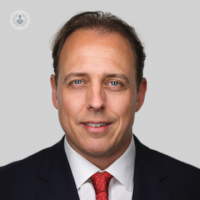How long can a voice disorder last?
Written by:Top Doctors recently spoke with esteemed consultant ENT surgeon, Mr Nick Hamilton, who, here in this article below, details what a voice disorder is, and explains how voice disorders can typically be caused, before outlining the diagnostic and treatment processes for voice disorders.

What is a voice disorder? How can it be caused?
A voice disorder is any condition that can change the voice. A change in voice can involve a change in the quality of the voice, difficulties with projecting and initiating voice, and difficulties with sustaining a clear voice for long periods of time. Voice disorders can be caused by a wide range of factors including problems with the vocal chords.
The vocal chords are paired structures, situated near where you can feel your adam’s apple. When you talk, the vocal chords come closer together and vibrate to produce a sound. The sound is then shaped into words by the structures higher up in your throat and mouth.
How do voice disorders affect quality of life?
Voice disorders can have a big impact on quality of life. The use of the voice is a fundamental part of communication. The loss of voice can therefore interfere with day-to-day tasks important for work and communicating with friends and family. An individual’s voice is also unique to them and a key part of their personality. Voice disorders can therefore lead to a loss of identify and problems with mental health.
How is a voice disorder diagnosed? What does an auditory-perceptual evaluation involve?
The diagnosis of a voice disorder relies on a specialist discussing the nature of the disorder and any associated symptoms or other relevant medical factors. An examination is then performed using an endoscope fitted with a strobe light.
This provides a detailed assessment of the vocal chords in terms of structure, movement, and vibration. Assessing a voice disorder can also include the use of an auditory-perceptual voice evaluation. These tests score the severity of the voice disorder and are helpful in assessing response to treatment.
What treatment options are available for voice disorders? How can voice therapy help, for example?
The treatment option for a voice disorder depends on the underlying cause. Treatments can involve voice therapy, medication, or surgery, or a combination of these. Voice therapy plays a big role in improving voice disorders by optimising vocal chord function and limiting anything that can cause damage.
How long can a voice disorder last?
Voice disorders can last for varying time periods. Acute laryngitis from an infection can cause a hoarse voice that settles within a few weeks. Other causes, such as scarring within the vocal cords can last for much longer.
If you have noticed that you have started to develop a hoarse voice, make sure you schedule in an appointment with Mr Nick Hamilton via his Top Doctors profile today.


